Assassin’s Creed Valhalla immediately drew comparisons with 2018’s God of War, but Ubisoft is not concerned over the perceived similarities between the two games.
The world premiere trailer for Assassin’s Creed Valhalla confirmed rumors that the popular series was moving into the Viking era. The first look at the game features a bearded man fighting with fellow Vikings against English forces. The hidden blade, a mainstay in the franchise, also made an appearance.
The Vikings of Assassin’s Creed Valhalla call to mind God of War, which placed an older Kratos in the unfamiliar territory of Norse mythology. However, Ubisoft is apparently not worried that the two games will end up being too similar to each other.
Assassin’s Creed Valhalla narrative director Darby McDevitt said that “God of War is great” and “fantastic” in an interview with GameSpot, but downplayed any possible issues from both games sharing a theme.
“I wouldn’t say we’re too worried because most games, when they touch this topic, they actually skew very heavily towards the mythology. So that’s the front-facing feature–you play God of War so you can go punch Baldur in the face, meet all these characters, and travel to fantastical environments,” said McDevitt.
McDevitt added that Assassin’s Creed Valhalla will be unlike most games set in the Viking era. “I think the urge is to always immediately lead with the mythology stuff, but we really want you to feel like you’re living in the Dark Ages of England, that you’re exploring the Roman ruins left behind 400 to 500 years earlier by the Romans and the remnants of the Britannic tribes before that and even the Saxon Pagans before they all converted to Christianity.”
Cory Barlog, the director of God of War, also chimed in, agreeing with McDevitt.
No one should be worried. The myths have been around a long time and will persevere through the ages providing countless creatives a deep well to pull from – provided they are willing to sacrifice an eye for the knowledge.????
VERY excited to play AC:Valhalla when it comes out.❤️ https://t.co/qwZIN4UmPv
— Cory Barlog???? (@corybarlog) April 30, 2020
Assassin’s Creed Valhalla launch in 2020 holidays
Ubisoft has already opened pre-orders for Assassin’s Creed Valhalla, which is set to launch for the PlayStation 5, PlayStation 4, Xbox Series X, Xbox One, PC, and Google Stadia in the 2020 holiday season.
The game’s main character is Eivor, who will lead the Vikings into excursions in England. Players may choose between a male and female version of Eivor, and will be able to build settlements as their home base.
Editors' Recommendations
- Best Amulet Enchantments and Relics in God of War Ragnarok: Valhalla
- Assassin’s Creed Nexus VR turned me into a sociopath (and I love it)
- All Lost Book locations in Assassin’s Creed Mirage
- The best skills to get in Assassin’s Creed Mirage
- iPhone 15 Pro can natively run the latest Resident Evil and Assassin’s Creed games


